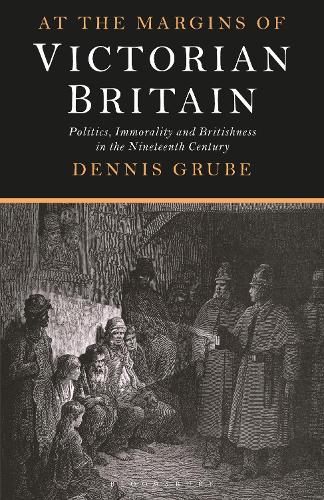
At the Margins of Victorian Britain: Politics, Immorality and Britishness in the Nineteenth Century
(Paperback)
Publishing Details
At the Margins of Victorian Britain: Politics, Immorality and Britishness in the Nineteenth Century
By (Author) Dennis Grube
Bloomsbury Publishing PLC
Bloomsbury Academic
30th April 2020
United Kingdom
Classifications
Tertiary Education
Non Fiction
Social and cultural history
History of religion
Migration, immigration and emigration
LGBTQIA+ Studies / topics
Ethnic studies / Ethnicity
Social groups: religious groups and communities
Political science and theory
Political structure and processes
Civics and citizenship
364.1523
Physical Properties
Paperback
232
Width 135mm, Height 216mm
277g
Description
Victorian Britain, at the head of the vast British Empire, was the wealthiest and most powerful country in the world. Yet, not all Britons were seen as possessing the characteristics that defined what it actually meant to be 'British.' At the Margins of Victorian Britain focuses on the political means of policing unwanted 'others' in Victorian society: the Irish, Catholics and Jews, atheists, prostitutes and homosexuals. In this groundbreaking study, Dennis Grube details the laws and conventions that were legally and culturally enforced in order to bar these 'others' from gaining power and influence in Victorian Britain. Utilizing a wide-ranging analysis, the book focuses on key case-studies: the anti-Semitism implicit in Lord Rothschild's barring from the House of Commons; the fine line between accepted male love and companionship and homosexuality, culminating in the Oscar Wilde trials of the 1890s; and how laws against disease were used to police prostitutes and correct moral vices. Political and legal rhetoric, backed by the force of legislation, set the boundaries of 'Britishness', and enforced those boundaries through the 'majesty' of British law. As Jews, Roman Catholics and atheists were brought into a genuine sense of partnership in the British constitution by being allowed to seek election to Parliament - homosexuals, prostitutes and the allegedly innately criminal Irish found themselves further and more vehemently displaced as the nineteenth century progressed. 'Otherness' stopped being a religious question and became instead a moral one. That fundamental shift marks the moment that 'Britishness' became a values-based question. And we've been arguing about what those values are ever since. This will be essential reading for those working in the fields of Victorian studies, social and cultural history and constitutional identity.
Author Bio
Dennis Grube is a Senior Lecturer in Politics in the School of Government and International Relations at Griffith University. His research interests focus on political rhetoric and its impact on public policy in both historical and contemporary settings. He lives in Brisbane, Australia.
